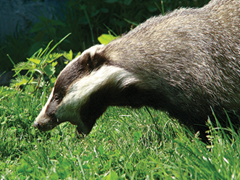Tackling wildlife crime
 agendaNi examines the tough legislation passed by the Assembly which aims to tackle wildlife crime and protect the region’s biodiversity.
agendaNi examines the tough legislation passed by the Assembly which aims to tackle wildlife crime and protect the region’s biodiversity.
People carrying out wildlife crimes such as illegally collecting the eggs of rare birds, poisoning birds of prey and badger baiting could face a prison sentence of up to six months, following the implementation of the Wildlife and Natural Environment Act 2011 on 18 August.
The organisation of, participation in or attendance at hare coursing and the transportation or possession of hares for that purpose are now banned, and carries a maximum fine of £5,000.
Enforcement authorities such as the police or wildlife officers will be given more powers to investigate alleged cases of wildlife crime.
The Act also extends protection to a wider range of wildlife including the sea horse, basking shark, puffin, red kite and cuckoo. The higher level of protection afforded to these animals means that they should not be killed or injured under any circumstances.
It aims to enhance the protection and conservation of Northern Ireland’s threatened or endangered wildlife.
Hare coursing was temporarily banned in the province under the Game Preservation (Special Protection for Irish Hares) Order in 2004, and is now permanently banned. Environment Minister Alex Attwood said it “should not take place in a modern, progressive, civilised society.”
The Minister announced the tough measures, saying: “Those committing wildlife crimes will be pursued and prosecuted. For the first time custodial sentences will be an option for the most persistent offenders.” A biodiversity strategy must be implemented by the department in order to provide increased protection for a greater range of plants; a list of which must be specified by DoE officials.
The Act also introduces a new statutory duty on government departments and all public bodies, in exercising their functions, to further the conservation of biodiversity. The department is producing guidance to help public bodies fulfil these new requirements. In addition, all departments now have a responsibility to “promote and embrace” nature conservation when carrying out their daily tasks.
Attwood contends that the Act “highlights the important role that the public sector can take in furthering the conservation of biodiversity when undertaking their functions.”
USPCA spokesman David Wilson welcomed the introduction of these new sentences. “It is something we have been campaigning for for some time and we look forward to its proper enforcement.”
He added: “Wildlife crime is not happening in urban areas. It’s happening in the countryside and will require the co- operation of people like farmers to report anything they see.
“Badger digging or badger persecution is one of the most serious wildlife crimes in Northern Ireland and we believe it to be quite widespread and certainly needs to be redressed. This [law] will go some way to help.”





